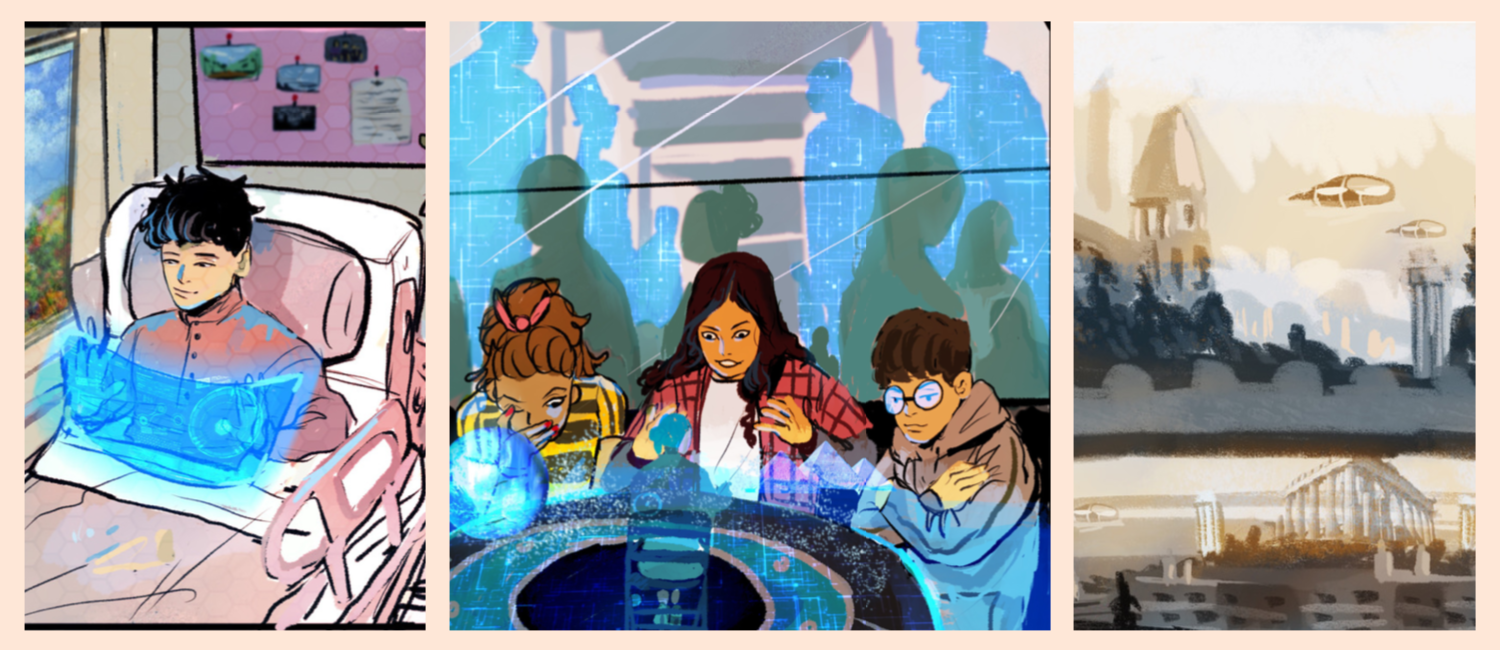
Speculative fiction as a genre of narrative storytelling has been used for decades to express dissatisfaction with social systems, whether in the form of gripping books such as 1984 by George Orwell or through dystopian shows such as Black Mirror. This isn’t surprising, as we have used the power of stories throughout human history to understand the world around us in times of change. Our affinity for stories allows us to hold a mirror up to ourselves. It also allows us to make sense of a capricious world where we face the push and pull of historical narratives and expanding technologies.
Ursula K. Le Guin said it best, “The story is one of the basic tools invented by the human mind for the purpose of understanding. There have been great societies that did not use the wheel, but there have been no societies that did not tell stories.” The practice of speculative fiction can allow us to face uncertainties of the future with the intention of forecasting a myriad of possibilities, giving us the chance to work backward and seek a favorable future. It’s even used by brands such as Nike and Boeing to postulate the future of their industries and trigger innovation. The emergence of Future studies has become a medium to explore the limits and potential of human ingenuity.
So why not try this in education? The evident gaps in our current education systems such as growing disparity and the skills gap have led to the emergence of alternative models that are student-centered, ecosystemic, and collaborative. Concurrently, there is an increasing appetite to invest in the education industry. In 2017 alone, the edtech sector received a record $9.5 billion investment, driven by the promise of exponential technologies like artificial intelligence. Combining the familiar and emerging medium of storytelling with education, we can explore how new models and technologies will be applied and assess the opportunities and ethical issues that could impact us for years to come.
Our attempt at experimenting this form of speculative fiction in education has resulted in Ed Futures – a series of short stories where we imagine and infer the technologies and human relationships that will shape the future of learning. Our collective forecasting is a meditation on our histories and current realities to create hypothetical scenarios where technologies are tested in different contexts. An “alter intelligence” that acts as a second voice in your mind might mean something completely different if you were living in a forgotten part of society and struggling to gain access or if you lived in a hyperconnected one. Although new technologies bind the stories the core of the series is about our humanity and its future.
Co-creating Inclusive Learning Worlds
By sharing stories of the unheard, the less privileged, and even the exclusively privileged, perhaps we can reflect on our reality and make better decisions about what, how, and who will build the tools and systems. We hope that this series of short stories is just a start and just a seed for the education community to absorb and grow.
We tested the waters in San Jose during the 2019 Curiosity Conference in April, where we convened 22 individuals working on the cusp of education, technology, and storytelling to start this evolving conversation. The notion of “science fiction for education” sparked immediate interest and conversations, and our deepest worries and aspirations were revealed during the evening. The second iteration of this collaborative storytelling exercise took place in Berlin, in a session during the WISE Emerging Leaders program to make sense of the current technologies and stakes that the fellows were grappling within their communities. A key takeaway from the group storytelling session was that even in technologically advanced states of being the most treasured learning still centered around human relationships and exploration.
We think this practice of storytelling to speculate the future of education is inviting for everyone – young or old, expert or novice, traditional or curious – anyone who is invested in the education of our future generations. It brings us together in a new way and also allows us to reflect deeply about our own understandings, biases, fears, and hopes. Speculative fiction is one of the many tools at our disposal as part of the education community to bring these important conversations to the forefront and act accordingly.
How fitting then that the WISE Summit in November is themed, “Unlearn. Relearn: What it means to be Human.” We can take a step back to unlearn what we know and unravel our biases through storytelling and reveal the essence of what we yearn, in order to make the future of learning one that is better for all.
Illustrations by Muna Abdirahman